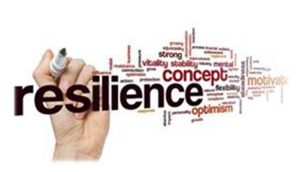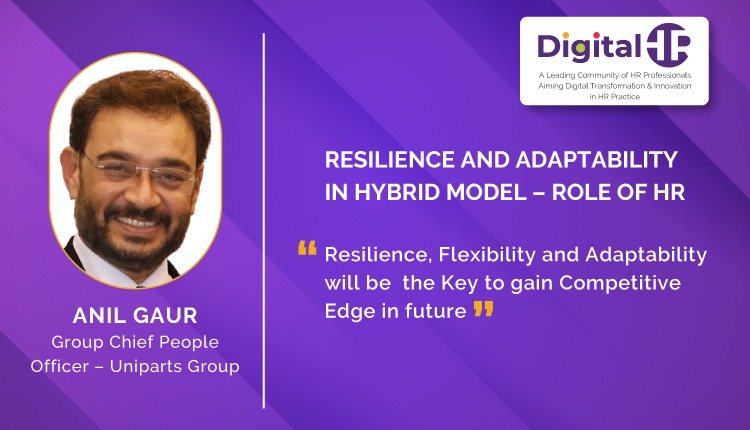The last 18 months have been very different and unprecedented. With each passing day, we are learning and trying to cope with the new surprises and accept the new norm, and, accordingly, trying to adapt and move on in life. We have seen in the past also that human being has always come out successful in many such situations and I am confident that, this time also we will overcome all the obstacles and evolve as better human beings and realize the importance of staying in co-existence with nature.
We need to acknowledge and appreciate that people have put in extra efforts and hard work, with no boundaries of days and time. They have done this along with all the other household challenges that they had to manage. With the limitation on the physical meetings in place, people have adapted and moved to online platforms. With extra coordination, collaboration, and synchronization, people have accomplished many activities working from home, which otherwise were never thought about.
From the beginning of the pandemic, HR people had to look at their organizational agility to keep up with the quick, unexpected changes to their workplaces – a massive transition to remote work, which we call the hybrid model. As the pandemic makes the future of many businesses uncertain, prioritizing and taking care of employees has become paramount. HR has always been responsible for this in some ways, but that responsibility has taken on a new meaning, and HR must drive these key priorities.
As it becomes increasingly clear that remote work or hybrid model will stay with us, I also believe that globally people or businesses will not go back to the old practices even after a few years when the deadly pandemic will vanish or when the world will have the solid treatment/vaccine of coronavirus.
Therefore, it will be pertinent for businesses to continue creating and redefining the culture, policies, and support system for remote workers while managing cybersecurity, compliance, and risks involved. This work requires close collaboration with everyone to ensure that people have what they need, to work remotely successfully. Also, HR will be responsible for figuring out how to keep the enterprise connected and has strong company culture in the absence of bustling offices and frequent, work-related travel.
Surely, this pandemic and its inherent effect on businesses have highlighted the need for adaptability and resilience in people that accelerate the shift towards a new, digital economy and also emphasizes the importance of HR function in the new normal. The business environment is dynamic and constantly changing. To succeed in this boundariless economy, we need to be resilient, flexible, and adaptable to gain a competitive edge in this rapidly changing environment. To be adaptable means always carrying a positive attitude towards life, situations.

Image Source – Google
I remember the quote of Charles Darwin ‘Survival of the Fittest’, and I think he did mean by it to be more flexible and adaptable as Fittest. When we look at this phrase in a business context, I am sure everyone will agree that nothing is called right or wrong in business. Any decision which serves a business purpose is the right decision and hence requires a flexible approach that demonstrates a high level of adaptability to a variety of business situations and difficulty levels. We have seen in the reality that more adaptable people or teams have many success stories compared to people with rigidity or who are not ready to change. When we look at resilience, I think people demonstrate themselves with the combined capability of thought processes, behavior patterns, attitude, aptitude, competence, and action-oriented approach.
By this time, we have realized that the pandemic has a damaging effect on mental health, and it is still unclear what the long-term effects of the pandemic will be on our overall well-being. That is why the health & wellbeing of employees has become and will continue to be the top priority. Although many companies already offered support through resources like medical assistance, life coaching, wellness education program, etc., it will be important for businesses & the HR industry to boost their visibility through increased communications when needed. They can add or expand certain offerings to ensure both employees and managers have access to the tools and resources they need to take care of themselves and effectively lead their teams.
One of the key challenges for HR during the initial phase of the pandemic was coordinating with leadership to reach and engage a diverse, distributed workforce. For example, although software like Zoom, google meet, cisco WebEx, Jisti Meet, Microsoft Teams, etc., has enabled better communication among remote workers. Still, it has also resulted in stress, fatigue, work-life imbalance. Also, the frontline employees without access to computers in their work environment haven’t always been kept in the loop. That is why it is important that now we utilize data-driven communication tools and software to understand people better and enable more effective, personalized two-way communication with people, no matter where they are located or what their work environment looks like.
Changing communication solutions, in particular, can be game-changers as they can readily show HR ‘What is Working’ and ‘What is Not Working’ with their approach to communicating with a diverse workforce, so it can be integrated and constantly improved. The pandemic has made it abundantly clear how essential frontline employees are. Still, historically, HR has almost exclusively maintained strong relationships with company leaders, partly due to a lack of effective communication tools. Moving forward, HR must build meaningful working relationships with frontline employees to ensure they have everything they need to do their job well and be fully supported.
A company’s culture guides how people act and approach their work. Now that so many are working remotely without in-person leadership, coaching, and accountability, cultivating a strong, healthy culture is even more critical. It is also crucial for organizations that cannot operate with remote work alone, particularly those that are now instituting new performance review processes and work models. We have to play a key role in strengthening and amplifying a great culture by improving internal communications, leveraging key employee engagement strategies, and equipping leaders with the skills they need to coach and support their employees effectively.
Let me give you a true and practical example of businesses in India. In many organizations, it has been seen that people often tend to be self-defensive whenever they are being asked questions or challenged. Even in leadership positions, most people spent more time arguing “Why it is not possible” rather than thinking proactively with positivity to say that “let us introspect and see how we can make it possible.” In business, being positive is important that helps people to be in control and on top of their agenda or key deliverables.
Emotional Intelligence also plays an effective role in this context because it helps people to understand feelings of self and others and to leverage it for the good of the enterprise, business, and people, as it also makes you understand that how your behavior is going to impact others on either side.
Another point for being resilient is to maintain ‘Work-Life Balance’. Generally, we believe that work-life balance means creating a balance between your work and personal life to get time for leisure or family or self-care, and we feel that it creates a separation between work and personal life. I heard many people saying that it implies a life loss while you are working and vice versa. But I think now that instead of talking about the work-life balance, we should focus on integrating work into our lives which means ‘Work-Life Integration’ rather than ‘Work-Life Balance.’
I think it is the result of changes happening in society. When I look at ‘Millennials’ or ‘Gen-Z,’ they have very high expectations from organizations regarding Work-Life Integration. These youngsters are conscious of their role, contributions, delivery, and career growth plan, and on another side, they want to be connected with their friends, family, and the entire world. They are focused on interpersonal relationships and want to have time to ‘Chill-Out,’ especially on the weekends, which means our young population always looks at integrating work with life.
It means that while they were enjoying their work and focused on performance and deliverables simultaneously, they also look at having their own space after office hours to spend quality time with friends/family, enjoy social networking, and be happy. I think this integration of work and life is an important tool to harness creativity or provide a sufficient amount of time for people to think through, explore the world, and discover the new ways and means of doing business.
Often, we talk that the old Ways and Means with which we have been running our businesses will not help us take the business to the next level; therefore, harnessing creativity is also important to create a culture of resilience and adaptability in any organization. In the future, I also foresee that people will be more focused on work-life integration with the invention of hybrid work culture. The people will prefer organizations that will provide equal opportunities to enjoy personal life and work. It will help the organization attract the right and best talent as a part of its hiring strategy.
About the author
The Author, Anil Gaur, Group Chief People Officer – Uniparts Group. Has 30+ years of accomplished career with leading Indian and multinational groups in Engineering, FMCG, Life Science Chemicals & Pharmaceuticals, and Automotive. Throughout career, he has worked in highly business-driven fast-paced organizations. He is passionate about Leadership Development, people capability & pro-active employee engagement through innovative HR practices.







